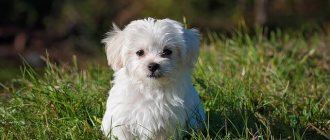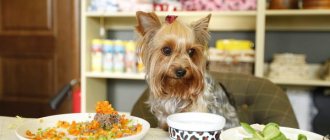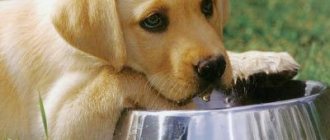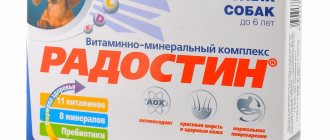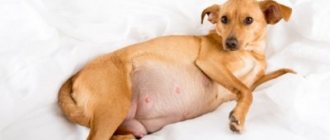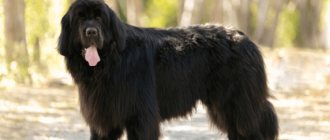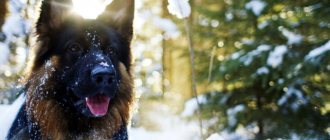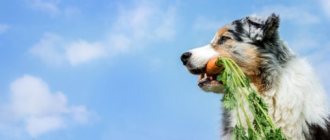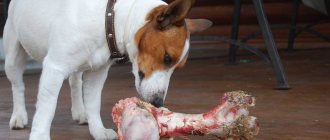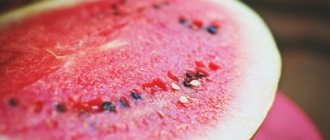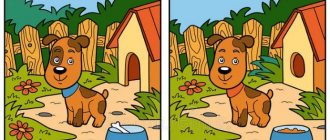Huskies are active, hardy dogs with an attractive appearance and complex character.
Despite the fact that, in general, representatives of this breed are unpretentious and do not require specific care and education, the issue of feeding them must be approached as responsibly as possible.
Because the appearance, health of the pet, and its life expectancy depend on it.
Natural food or artificial food?
The Husky diet can be based on both natural products and industrial food . It is impossible to say unequivocally which type of nutrition is better - each has advantages and disadvantages, supporters and opponents.
The only thing we can say with confidence is that nutrition must be balanced and take into account the age, health and physiological characteristics of the dog.
It is strictly forbidden to mix both types of food, since the animal’s body produces different enzymes to process natural products and feed..
A mixed diet has a negative impact on the dog's health and can lead to gastrointestinal problems.
Breeders who choose natural food for their pets motivate this mainly by the fact that all the nutrients entering the dog’s body with such a diet are of natural origin and are better absorbed.
At the same time, dry food contains all the necessary vitamins and minerals necessary for the healthy growth and proper development of a husky.
Huskies do not have a tendency to overeat and become obese and, unlike other breeds, these dogs have a protein-fat, rather than a protein-carbohydrate metabolism..
Expert opinion
Tolkachev Andrey Mikhailovich
veterinarian
The main mistake of inexperienced dog breeders is mixed nutrition. This is what most often leads to the development of various pathologies associated with the gastrointestinal tract of dogs. Also, many people mistakenly believe that natural food allows you to feed the dog leftovers from the common table, which is fundamentally wrong. That is why most breeders prefer to use industrial food that contains everything necessary for the pet’s health and has a balanced composition. Such food is easy to store and use, and the recommended daily serving size is already indicated on the packaging. The owner’s only task is to choose food that takes into account the characteristics and needs of a particular dog.
What vitamins to give huskies
For the proper development of the Husky's body, a complex of nutrients is required.
Husky is a working dog that needs regular physical activity and outdoor activities. It cannot be raised as a decorative dog, otherwise the pet's health will suffer. Husky is one of the representatives of sled dogs, although today it is used as a walking companion.
Despite the fact that huskies naturally have good health and an immune system, this breed will require proper nutrition, healthy supplements and microelements to maintain their body. First of all, huskies need those substances that ensure the health of the skeleton, ligaments, and muscular system. You should also take care of the animal’s skin and fur, as they are one of the indicators of health. Medicines are also needed to maintain the pet’s vitality and activity.
Puppies especially need vitamin A. It supports the functioning of many organs, as well as the lacrimal glands, due to which the animal’s vision is sharpened. It promotes the formation of a strong immune system in the puppy. In addition, it is a powerful antioxidant.
The diet should be varied and contain vitamins
B vitamins are necessary for a strong nervous system; they prevent the development of anemia and some other diseases. They have a positive effect on hair growth, skin health, and are necessary for the functioning of muscles, mucous membranes of the eyes and the dog’s mouth. They also contribute to the rapid growth of the animal.
We recommend reading: What vitamins should a child take if they have a fracture: children’s vitamins for bones
Vitamins D and E influence the growth of the animal and the formation of its skeleton. Prevents the development of rickets and bone atrophy. They are important for the health of the animal’s skin and have a positive effect on the reproductive function of the pet.
Vitamins C and K are a source of protection against viruses and infections, are important for the functioning of enzymes, and are responsible for blood clotting. They also participate in metabolism and promote calcium absorption.
In addition, Husky dogs require trace elements - calcium, zinc, iodine, iron, phosphorus, sodium and many others. If the animal’s diet consists of natural products, then complexes with mineral supplements are vital.
Husky dogs often have some bad habits, by observing which the owner can understand what beneficial substances the animal’s body requires.
For example, a pet clearly does not have enough calcium if it chews on the ground or plaster. If the animal has a decreased appetite or gets tired quickly, it will require vitamin C. A lack of vitamin P leads to the fact that the husky picks up cigarette butts and eats them. In the presence of pathologies such as diarrhea, dermatitis, inflammation of the oral mucosa, vitamin PP is needed. A lack of B vitamins leads to the development of anemia. Tousled hair that lacks shine indicates a lack of vitamin A in the pet’s body. Bone pathologies indicate a lack of vitamin D.
Attention! A veterinarian will help you determine exactly what nutrients your pet is missing after examining the animal.
General recommendations for healthy feeding at home
Proper nutrition is one of the main components of healthy growth and development of a dog.
To eliminate possible mistakes regarding feeding your pet, you must follow several recommendations:
- the diet should consist of 70% dietary meat;
- you need to give your dog both boiled and raw vegetables;
- approximately 10% of the diet consists of cereals such as rice and buckwheat;
- Adult dogs should not be given milk, but fermented milk products are necessary to ensure proper functioning of the gastrointestinal tract;
- Do not feed your husky food too cold or hot;
- It is prohibited to mix industrial feed and natural products;
- all food must be fresh, prepared from high quality products;
- it is important to follow the feeding regime;
- with a natural diet, it is necessary to give your pet additional vitamins and minerals;
- The dog should always have drinking water freely available.
You should not feed your dog before bedtime, walks or trips in public transport or a car . The bowl of food should be left for 20-30 minutes, after which it should be removed, even if the dog has not eaten everything.
It is necessary to ensure that the pet receives vitamins A, E, C, D, B, K, PP, calcium, copper, iron, iodine, zinc, as well as glucosamine, collagen, chondroitin and polyunsaturated acids.
General recommendations
Before you create your own husky diet, you need to decide on the type of optimal nutrition . To feed this breed, not only ready-made industrial dry food can be used, but also natural products. Industrially produced food must be high quality, premium or elite class.
When compiling a diet, the peculiarities of metabolic processes must be taken into account. The main difference between the Husky and most other breeds is the lack of a tendency to overeat or become obese. Even in very ancient times, huskies fully retained their performance in the absence of an increased amount of feed, which determines the formation of a peculiar protein and fat metabolism, completely atypical for other breeds.
Important! The main feature of the husky’s digestive system is the unique ability to easily digest meats that are distinguished by their fat content and protein content.
Healthy eating rules
To provide your pet with a complete and well-balanced diet, when compiling a diet, you need to focus on the following general recommendations:
- approximately 70% of the diet should consist of meat, which can be represented by horse meat, rabbit, chicken and beef;
- vegetables in the diet can be boiled: zucchini, pumpkin, white cabbage and cauliflower, as well as raw: carrots and cucumbers;
- approximately 10% of the diet consists of cereals such as rice and buckwheat;
- Dairy products are best given in the form of kefir and cottage cheese with the addition of chopped apple.
It is not recommended to feed your dog at night just before bed, or to leave a bowl of food in front of the animal for more than 20-25 minutes, or to feed your pet before traveling in a car or public transport.
This is interesting! By their physiology and nature, Siberian Huskies do not require too much food, and the lack of sufficient exercise, a sedentary lifestyle, errors in care and the age characteristics of the pet can cause a complete refusal to eat.
Natural nutrition
Until recently, this food option was the main and most popular. Despite the obvious benefits of traditional nutrition, it is quite difficult to properly balance such a diet on your own.
Offal and meat trimmings will be a very useful component of natural nutrition . Feeding with tripe, veal or chicken liver, kidneys and heart is good. A couple of times a week, it is advisable to supplement the diet with boiled sea fish of not too fatty varieties, previously deboned.
Vegetables and greens can be given to your pet in the form of carrots, spinach, beets, lettuce, pumpkin, zucchini and cucumbers. Chopped or grated vegetables and greens are added to porridges or meat dishes. Fresh chopped vegetables must be seasoned with a small amount of vegetable oil or sour cream. Rice, buckwheat or oatmeal can be cooked in broth or water, without adding salt.
This is interesting! Huskies do not have chewing teeth at all, and for this reason, in order not to cause disruptions in the digestive process, it is absolutely forbidden to give minced meat to a dog of this breed.
In the first half of the day, fermented milk food in the form of cottage cheese, kefir, sour cream, yogurt or whey is ideal. Boiled eggs are given once a week. It is important to remember that when choosing a natural diet, the use of mineral and vitamin supplements is a prerequisite.
Dry and wet food
According to experts and experienced breeders, food from the German manufacturer HAPPY DOG is very suitable for feeding huskies. They are of the highest quality and designed for pets of different ages and with different levels of physical activity.
The peculiarity of the food is represented by a unique bioformula consisting of 28 different medicinal herbs, with the addition of fermented grains, biologically active microadditives, flax seeds, as well as essential fatty acids. The food does not contain dyes or preservatives, as well as soy extracts that can cause any negative processes in the body of a pet.
Pros and cons of natural food
A natural diet allows the owner to independently choose food for the dog, controlling their quality and freshness.
In addition, this type of nutrition has a number of other advantages.:
- the composition does not contain chemical dyes, flavors, flavor enhancers and preservatives, which not only do not provide any benefit to the dog, but can also adversely affect its health;
- all vitamins and macro- and microelements contained in the products are of natural origin and are better absorbed by the animal’s body;
- If your pet has an allergic reaction to one of the products, it can be replaced with an analogue without changing the entire diet.
In addition, with a natural diet, you can make the husky’s menu as varied as possible, which will minimize or completely eliminate the likelihood that the dog will get bored with food.
The disadvantages of this type of nutrition include:
- large amounts of time spent preparing food for your pet;
- inconveniences associated with feeding while traveling;
- lack of opportunity to prepare food for future use.
It is also important to understand that it is impossible to independently create a balanced diet for a husky without certain knowledge of veterinary nutrition..
List of permitted and prohibited products
When choosing natural food in the husky menu, you must include:
- meat (beef, veal, poultry, rabbit) is a source of protein, iron, magnesium, calcium, vitamins A, E, D;
- offal (trachea, tripe, liver, lungs, ears, lips, tendons, tails) - to preserve the maximum amount of useful substances, you need to purchase and cook them in an unrefined form;
- sea fish without bones, scales, gills, intestines (salmon, salmon, pink salmon) - contains protein, zinc, magnesium, calcium, iodine;
- boiled eggs are a source of protein, animal fat, organic acids, vitamins and microelements;
- eggshells - a small amount as an additional source of calcium;
- fermented milk products (natural yogurt, kefir, cottage cheese) are a source of calcium and contribute to the normal functioning of the gastrointestinal tract;
- animal and vegetable fats (fish, olive, soybean, sunflower, corn oil);
- vegetables and fruits (carrots, tomatoes, pumpkin, cabbage, zucchini, turnips) are a source of vitamins C, B, A, fiber, microelements and acids;
- cereals (rice, buckwheat, oatmeal);
- large "sugar" bones.
You can't feed the husky:
- confectionery products;
- grapes and raisins;
- pork and lamb;
- pickles, smoked meats;
- oranges, tangerines;
- potatoes;
- milk;
- spicy, salty foods;
- tubular bones;
- river fish;
- bread and baked goods;
- pasta;
- legumes;
- chicken feet and bones;
- lard;
- nuts.
It is also prohibited to give your dog vitamins intended for humans and leftovers from the common table.
Sample menu for the week
| Day of the week | Daily menu | Menu under workload |
| Monday | 400 g chicken meat, sprinkled with yogurt, 150 g buckwheat porridge, 1 tsp. vegetable oil, 150 g boiled carrots and beets | 300 g chicken meat, 200 ml yogurt, 2 boiled carrots, 150 g internal organs, offal and trimmings, 150 g buckwheat porridge, 130 ml kefir |
| Tuesday | 450 g veal kidneys and offal, 200 ml kefir, 130 g green vegetables | 250 g sea fish, 150 g rice porridge, 1 raw egg, 250 g offal, 150 g yogurt, 120 g boiled vegetables |
| Wednesday | 500 g pink salmon, 150 g rice porridge, 200 ml natural yogurt | 300 g beef, 120 g yogurt, 1 tsp. vegetable oil, 120 g boiled cabbage and beets, 200 g buckwheat porridge, 150 g cottage cheese, 1 apple |
| Thursday | 450 g rabbit or beef, 150 g yogurt, 130 g boiled carrots and celery, 1 raw egg | 250 g chicken waste, 150 g oatmeal, 20 g boiled carrots, 1 tsp. vegetable oil, 250 g rabbit meat, 200 ml yogurt, 120 g boiled pumpkin, 1 raw egg |
| Friday | 450 g internal organs, offal, poultry trimmings, 150 g oatmeal, 150 g cottage cheese, 1 tsp. vegetable oil | 300 g chicken fillet, 280 ml yogurt, 130 g boiled beets and celery, 1 tsp. vegetable oil, 200 g oatmeal, 150 g cottage cheese, 1 apple |
| Saturday | 450 g veal, 200 g natural yoghurt, 130 g boiled pumpkin, 1 raw egg | 250 g sea fish, 150 g rice porridge, 1 raw egg, 200 g beef offal and trimmings, 150 ml yogurt, boiled carrots |
| Sunday | 250 g buckwheat porridge with meat, 200 g cottage cheese, 150 ml natural yogurt, 1 apple | 300 g veal, 150 g buckwheat porridge, 280 ml yogurt, 1 tsp. vegetable oil, 200 g offal, 130 g boiled vegetables, 1 egg |
Industrial feed
As with natural nutrition, feeding with industrial feed has both advantages and disadvantages.
The advantages of such a diet include:
- balanced composition, enriched with all necessary vitamins, macro- and microelements, which eliminates the need to take additional nutritional supplements;
- saving time on preparing food for your dog;
- simplicity and ease of use and storage;
- the opportunity to buy food for the husky for future use;
- indication on the packaging of information regarding the daily intake of feed.
A wide range of industrial feeds allows you to choose a diet for your pet in accordance with its age, activity level, physiological characteristics and health status.
In addition, a special composition covering dry food granules acts as an additional measure to prevent the formation of plaque and stones.
Disadvantages of this diet:
- Cheap feeds may contain low-quality meat and offal;
- there is a possibility of the presence of artificial colors, flavors, preservatives and flavor enhancers.
It is also important to understand that if an allergic reaction occurs to one of the components of the food, the dog’s diet will need to be completely changed.
NOTE!
Industrial feeds can be not only dry, but also wet - they contain up to 80% liquid.
Products of different quality can be used in feed, which is why they are divided into several classes.:
- economy - the composition is based on low-quality products, the possibility of containing soy, beans, and chemical additives is possible;
- premium - products of this class are based on meat, offal and vegetables, but the composition is not enriched with vitamins and minerals;
- super premium - high quality products are used to make such food; vitamins and minerals are included.
Also, almost every company produces lines of hypoallergenic and holistic food, the composition of which is close to natural nutrition.
Types of diet for Siberian Huskies
Despite the recommendations of experts, owners themselves have the right to determine the type of diet for their pet. Currently, there are three main types of feeding for Siberian Huskies:
- Natural diet , which involves independently compiling the necessary proportions of nutrients and daily preparing fresh food for the dog. The feed should be served warm and thick; uneaten leftover feed should be discarded. With natural feeding, meat products should make up 50-70% of a husky’s diet during heavy workloads, and 30-50% during a normal lifestyle. The traditional diet for dogs is based on the use of beef, veal, beef by-products, fatty sea fish, eggs, dairy products, vegetables, fruits, vegetable oils, and herbs. A prerequisite is the use of vitamin and mineral supplements. The main advantage of a natural diet is the absence of preservatives, but it is often quite difficult to provide a varied diet with the correct ratio of nutrients.
When feeding a husky, carbohydrates should make up no more than 10% of the diet, which means that it is impossible to raise a healthy northern pet on oatmeal alone!
- Industrial feed. The main advantage of industrial feeds is their balance; the owner can only strictly follow the dosage indicated on the manufacturer’s original packaging. Today there are 4 classes of dry dog food:
- Economy class. The cheapest food, designed for the mass consumer, can be bought at any supermarket or pet store. Low-grade grain raw materials, chicken by-products and preservatives are used to produce economy-class feed. Most often, meat is completely absent from such products.
- Premium class. This class of feed contains meat and chicken by-products, grains and legumes, vitamin and mineral components.
- Super premium class. To produce super premium dry food, reputable manufacturers use high-quality meats, vegetables, hypoallergenic grains and natural preservatives. The products are free of GMOs and dyes.
- Holistic class. The highest quality and most expensive food, consisting primarily of meat, medicinal herbs, vegetables, berries, and a vitamin and mineral complex.
The type of food for a husky is selected in accordance with the load, age and physiological state of the pet; dog handlers and veterinary specialists recommend using super premium and holistic class food for feeding northern breeds.
- Mixed nutrition. With a mixed diet, natural products and dry food are used simultaneously. This type of feeding causes fermentation processes in the intestines due to a different mechanism for digesting ingredients. Abuse of mixed feeding leads to the development of gastrointestinal pathologies, baldness and exhaustion of the animal.
Under no circumstances should you use mixed food to feed a husky of any age!
How to feed a puppy correctly?
The table shows how to properly feed a puppy by month.
| Age | What to feed | Number of feedings per day |
| 1 month | Newborn puppies feed on mother's milk; if this is not possible for any reason, milk substitutes (Royal Canin Babydog Milk) should be used. You should start feeding puppies at 3-4 weeks, gradually giving them milk porridge, cottage cheese, meat broth, grated boiled carrots | 6-8 |
| 2 months | You can gradually introduce new vegetables, herbs, cereal porridge with finely chopped meat, eggs, fruits (grated apples), and dairy products into your diet. | 5 |
| 3-4 months | At the age of 3 months, huskies eat raw meat, otherwise the diet remains unchanged. By 4 months, instead of meat, you can occasionally give sea fish | 4 |
What to feed a husky puppy - types of diets, advantages and disadvantages
Ask the breeder what to feed your husky puppy before moving to a new home. Stock up on the necessary products for 10-14 days and maintain the cleanliness of food that your new pet is accustomed to. This approach will reduce the puppy’s stress level after the move and speed up its adaptation.
Next, you need to decide what type of diet your pet will be kept on. There are natural, industrial and mixed types of diet, each of them has advantages and disadvantages, let's take a closer look.
Natural diet for a husky puppy
A natural diet for a husky puppy is more natural and optimal. A natural diet means feeding your dog meat porridge, which consists of meat, cereals and vegetables. During puppyhood, protein foods should predominate in the diet.
Benefits of a natural diet for a husky puppy:
- Puppies readily consume a variety of natural foods.
- You can always control the freshness and quality of the food you feed your dog.
- You can adjust your puppy's diet depending on his needs, time of year, rate of weight gain, and so on.
- Husky puppies are very playful, and large, meaty bones occupy the baby's attention for a long time.
- Feeding natural, high-quality products is cheaper than keeping them on high-quality industrial feeds. When keeping small dogs, this difference is not very noticeable, but when it comes to a large dog, you need to sensibly assess your capabilities.
Disadvantages of a natural diet for a husky puppy:
- It takes time to prepare high-quality, balanced food.
- Prepared food should not be left in a bowl, especially in hot weather.
- If the diet is not prepared correctly, there is a risk of developing vitamin deficiency or lack of minerals.
A husky puppy can be switched to a natural diet from the age of one month. If there is a need to feed a puppy from birth, it is better to use a bitch's milk substitute, and at 3-4 weeks of age the puppy can be switched to whole milk.
Ready-made food for husky puppy
Ready-made feeds vary by type and class. Economy class food is considered to be of low quality, premium and super premium class products are suitable for everyday feeding of healthy animals, holistic food is as close as possible to the natural composition. Only wet and semi-moist food of at least premium class is suitable for feeding husky puppies.
How to feed an adult dog
When the dog reaches the age of 1 year, it needs to be switched to two feedings a day.
When a diet based on industrial food, you should follow the recommendations indicated by the manufacturer on the packaging, and choose the food itself taking into account all the characteristics of the pet.
IMPORTANT!
Natural feeding should be based on animal protein - the husky’s diet should contain at least 70% meat and meat products.
In general, representatives of this breed eat quite little, which is due to their occurrence. The ancestors of modern huskies spent a lot of time on the road and survived in conditions of nutritional deficiency.
It was these factors that determined the formation of a special metabolism in these dogs..
Whatever the type of nutrition, it is important to follow the feeding regimen and basic recommendations for choosing and preparing a diet.
